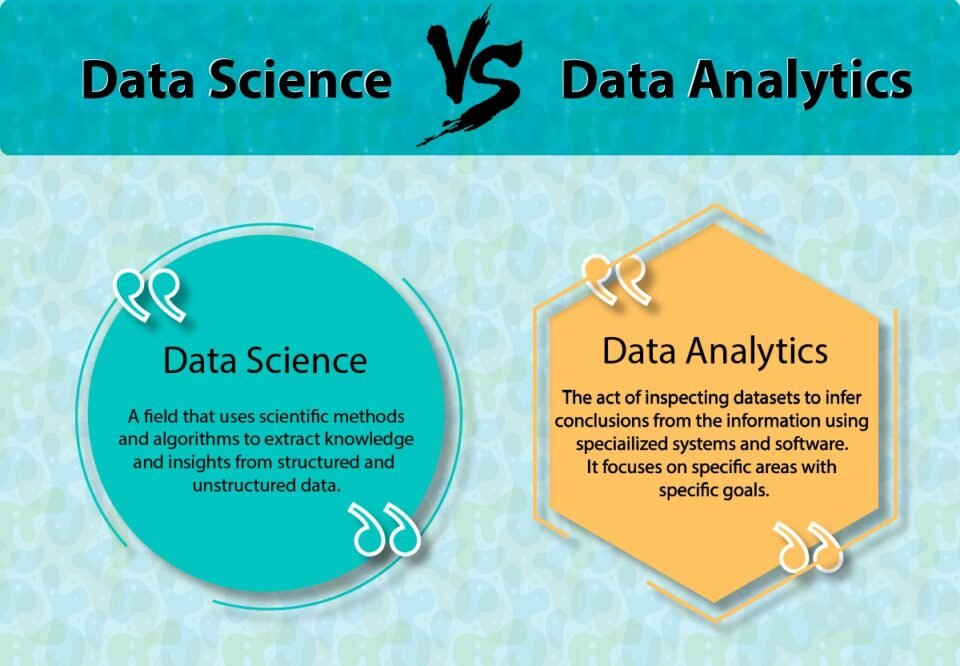Since the rise of Big Data, it has brought two more buzzwords along with, in the industry, i.e., Data Science and Data Analytics.
Today, the entire world generates a massive amount of data through various sources, hence named Big Data. The data generated every day is so vast and complex that traditional data processing tools and systems can not handle it, and thus Data Science and Data Analytics come into the picture.
Data Science and Data Analytics are the two emerging technologies. We more often use Data Science and Data Analytics vice-versa as both Data Analysts and Data Scientists work with Big Data. However, they still have quite a few differences that stand out from each other. Any Post Graduate Program in Data Analytics discusses their difference in detail.
This article will give you a clear insight into the difference between Data Science vs Data Analytics.
Data Science vs. Data Analytics
Data Science and Data Analytics take a unique approach to deal with Big Data.
Data Science is a disciplinary combination of Computer Science, Machine Learning, Artificial Intelligence, Statistics, and Mathematics. It uses scientific methods, processes, algorithms, systems, and tools to find unseen patterns, derive meaningful information from various types of complex data sets (structured, unstructured, semi-structured).
On the other hand, Data Analytics is mainly concerned with Statistics, Analysis, and Mathematics. Data Analytics is the process of analyzing raw data and extracting meaning out of it using specialized computer systems.
Data Science and Data Analytics are the two sides of the same coin.
Data Science looks around to discuss new and unique questions that can drive business innovation. In contrast, Data Analytics aims to find solutions to the questions and determines how those can be implemented within an organization to drive data-based innovation. In short, Data Analytics is a subset of Data Science that focuses on more specific answers to the questions.
What Does a Data Scientist Do?
Data Scientists use mathematical and statistical techniques to clean, process, and interpret data to extract information. In addition, they build advanced data modeling, processes prototypes, and Machine Learning algorithms.
What Does a Data Analyst Do?
A Data Analyst examines huge data sets to identify and draw conclusions. They collect a large amount, and various types of raw data analyze and organize the data to identify the patterns. After the analysis, they represent their findings through charts, graphs, etc.
<iframe width=”560″ height=”315″ src=”https://www.youtube.com/embed/-s0sVShQNcE” title=”YouTube video player” frameborder=”0″ allow=”accelerometer; autoplay; clipboard-write; encrypted-media; gyroscope; picture-in-picture” allowfullscreen></iframe>
Data Science vs. Data Analytics: Job Roles
As we know, Data Scientists and Data Analysts both deal with a huge amount of data. Moreover, both the roles perform collecting, cleaning, and analyzing data to gain actionable insights from it. Hence the roles and responsibilities often overlap.
Data Scientists Roles and Responsibilities
- Processing, cleaning, and validating the data
- Performing Data Analysis on extensive data sets
- Creating ETL pipelines
- Identifying new trends and patterns in the data
- Performing data mining
- Building resourceful ML libraries
- Writing code for automation
Data Analysts Roles and Responsibilities
- Collecting and interpreting data
- Identifying relevant data sets
- Performing data queries through SQL
- Using data visualization tools for presenting the information
- Building data visualization tools, dashboards, and reports
- Writing programs to automate processing and data collection
Data Science vs. Data Analytics: Skills Required
Data Scientists and Data Analysts both need to work on a large amount of data; here are a few skills that are mandatory to be in the data field:
- Well versed in Statistics
- Experienced in using Big Data tools such as Hadoop Spark. Tableau, and Talend
- Proficient in programming languages (R, Python, Java)
- Database knowledge such as MYSQL, Microsoft SQL Server, Oracle Database, and Teradata
- Well versed in Data wrangling, Machine Learning, and Artificial Intelligence concepts
Data Science vs. Data Analytics: Career Outlook
The career path for Data Science and Data Analytics are quite similar across all the companies and industries. Data Scientists aspirants should have an educational background in Computer Science, Information Technology, or Data Science. Data Analyst aspirants should have an educational background in Computer Science, Information Technology, Mathematics, and Statistics.
Data Science was named as the fastest-growing job in 2017 by LinkedIn, and in 2018 Glassdoor ranked Data Scientist as the best job in the United States.
Data Science vs. Data Analytics: Which One is the Right Career For You?
Data Scientist and Data Analyst requires a solid grasp of technical skills and a mathematical mindset. However, Data Analyst is more of an entry-level job position with experience of 2-5 years; on the other hand, Data Scientists are experienced professionals with 5+ years of experience in the field. So, to begin with, you need to start your career as a Data Analyst, and then with the gained experience and skill set, you can step up as a Data Scientist.
When talking about salary, both Data Analysts and Data Scientists are well paid off. The average salary of a Data Analyst is $62,566 per year, while a Data Scientist earns $97,051 per year. Although, the salaries do differ depending upon the candidate’s skill-set, experience, and expertise they bring to the table.
Choosing a career in Data Science or Data Analytics is the right choice in any data enthusiast’s career, as the demand for data professionals is rapidly scaling up and expected to grow more in the coming years.
Data Science and Data Analysis are two sides of a coin; hence there isn’t much difference. However, the roles and responsibilities differ a bit due to the level of experience. Therefore, the choice between the two domains lies with the interest, career goals, and experience one has.

